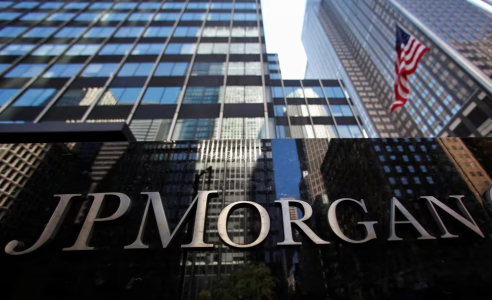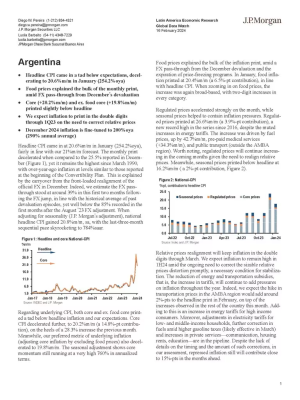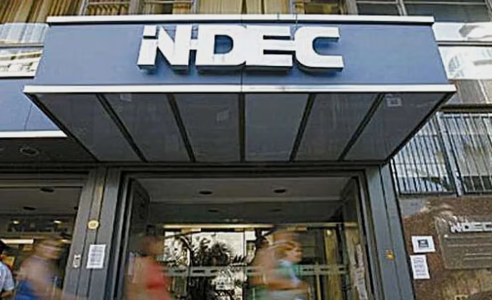Ron
Active member
What will happen to the dollar and inflation in Argentina this year, according to the largest bank in the US. - Infobae

Source:

 www.infobae.com
www.infobae.com
February 19, 2024
A JP Morgan report estimated the evolution of prices in Argentina this year and anticipated what may happen to the official exchange rate, among other factors.
By Martin Kanenguiser

What will happen to the dollar and inflation in Argentina, according to the largest bank in the US. REUTERS/Mike Segar/File Photo
The investment bank JP Morgan predicted that there will be a new devaluation of the official exchange rate and that inflation would reach 200% by the end of the year. Furthermore, in a report on the price situation, the powerful North American bank estimated that this month and next the consumer price index (CPI) will remain in double digits.
He also calculated how much repressed inflation reaches and what its impact will be on the Indec price index. According to the JP Morgan research team, “food prices explained most of the inflation in January, in a context of the impact of the December devaluation and the expiration of price freezing programs.”
“In January, food inflation stood at 20.4% month-on-month (a contribution of 6.5%), in line with the general CPI.” Inflation last year was 254%, compared to the 121% recorded in Venezuela, according to the Venezuelan Finance Observatory (OVF). It remains to know the price data for Lebanon last month – in December it reached 192% annually – to know if Argentina was, once again, first in the global ranking.

JP Morgan report
In this context, Morgan stated that inflation will continue in double monthly digits this first quarter and anticipated that there will be another devaluation jump in the official market next June, "after which we expect the economy to stabilize at an inflation rate of one digit if the stabilization program turns out to be successful.”
Regarding the January result of Indec, Morgan indicated that "if we focus on food prices, the increase was once again generalized, with double-digit increases in all categories."

January inflation was the highest in the world
Meanwhile, he explained that “regulated prices registered a strong acceleration in the month, while seasonal prices contributed to containing inflationary pressures.”
“Regulated prices were 26.6% m/m, a new historical high in the series since 2016, despite the attenuated increases in energy rates,” he said.
“The increase was driven by fuel prices, which rose 42.7% m/m, prepaid medicine services (+34.3% m/m) and public transportation (outside the AMBA region)” , he detailed.
“It should be noted that regulated prices will continue to increase in the coming months, given the need to readjust relative prices. For their part, seasonal prices were below the general level, by 16.2% m/m,” he clarified.
In this way, “the readjustment of relative prices will keep inflation in double digits until March. "We expect inflation to remain high in the first half of the year, given the need to quickly correct the considerable distortion of relative prices, a necessary condition for stabilization."
This correction will continue to “add pressure on inflation throughout the year. In fact, we expect that the increase in transportation prices in the AMBA region will add around 2% percentage points to general inflation in February, in addition to the increases observed in the rest of the country this month.
Added to this factor is an increase in energy rates for high-income consumers. In addition, adjustments are expected in electricity rates for low- and middle-income households, a new fuel correction due to the increase in taxes (probably effective in March) and increases in private services (communications, housing rentals, education)".
For this reason and "despite the lack of details on the timing and amount of these corrections, in our assessment, repressed inflation will continue to contribute close to 15% points in the coming months."
“We estimate that the transfer to prices was around 39% in these first two months after the exchange rate jump, in line with the historical average of previous devaluation episodes, although well below the 85% registered in the first months after the exchange rate adjustment of August 2023″, stated the Morgan experts. “The seasonal adjustment shows that the momentum of core inflation remains 760% in annualized terms,” they warned.

Source:

Qué pasará con el dólar y la inflación en la Argentina este año, según el banco más grande de EE.UU.
Un informe del JP Morgan estimó la evolución de los precios en la Argentina este año y anticipó qué puede pasar con el tipo de cambio oficial, entre otros factores
February 19, 2024
A JP Morgan report estimated the evolution of prices in Argentina this year and anticipated what may happen to the official exchange rate, among other factors.
By Martin Kanenguiser

What will happen to the dollar and inflation in Argentina, according to the largest bank in the US. REUTERS/Mike Segar/File Photo
The investment bank JP Morgan predicted that there will be a new devaluation of the official exchange rate and that inflation would reach 200% by the end of the year. Furthermore, in a report on the price situation, the powerful North American bank estimated that this month and next the consumer price index (CPI) will remain in double digits.
He also calculated how much repressed inflation reaches and what its impact will be on the Indec price index. According to the JP Morgan research team, “food prices explained most of the inflation in January, in a context of the impact of the December devaluation and the expiration of price freezing programs.”
“In January, food inflation stood at 20.4% month-on-month (a contribution of 6.5%), in line with the general CPI.” Inflation last year was 254%, compared to the 121% recorded in Venezuela, according to the Venezuelan Finance Observatory (OVF). It remains to know the price data for Lebanon last month – in December it reached 192% annually – to know if Argentina was, once again, first in the global ranking.

JP Morgan report
In this context, Morgan stated that inflation will continue in double monthly digits this first quarter and anticipated that there will be another devaluation jump in the official market next June, "after which we expect the economy to stabilize at an inflation rate of one digit if the stabilization program turns out to be successful.”
Regarding the January result of Indec, Morgan indicated that "if we focus on food prices, the increase was once again generalized, with double-digit increases in all categories."

January inflation was the highest in the world
Meanwhile, he explained that “regulated prices registered a strong acceleration in the month, while seasonal prices contributed to containing inflationary pressures.”
“Regulated prices were 26.6% m/m, a new historical high in the series since 2016, despite the attenuated increases in energy rates,” he said.
“The increase was driven by fuel prices, which rose 42.7% m/m, prepaid medicine services (+34.3% m/m) and public transportation (outside the AMBA region)” , he detailed.
“It should be noted that regulated prices will continue to increase in the coming months, given the need to readjust relative prices. For their part, seasonal prices were below the general level, by 16.2% m/m,” he clarified.
In this way, “the readjustment of relative prices will keep inflation in double digits until March. "We expect inflation to remain high in the first half of the year, given the need to quickly correct the considerable distortion of relative prices, a necessary condition for stabilization."
This correction will continue to “add pressure on inflation throughout the year. In fact, we expect that the increase in transportation prices in the AMBA region will add around 2% percentage points to general inflation in February, in addition to the increases observed in the rest of the country this month.
Added to this factor is an increase in energy rates for high-income consumers. In addition, adjustments are expected in electricity rates for low- and middle-income households, a new fuel correction due to the increase in taxes (probably effective in March) and increases in private services (communications, housing rentals, education)".
For this reason and "despite the lack of details on the timing and amount of these corrections, in our assessment, repressed inflation will continue to contribute close to 15% points in the coming months."
“We estimate that the transfer to prices was around 39% in these first two months after the exchange rate jump, in line with the historical average of previous devaluation episodes, although well below the 85% registered in the first months after the exchange rate adjustment of August 2023″, stated the Morgan experts. “The seasonal adjustment shows that the momentum of core inflation remains 760% in annualized terms,” they warned.

